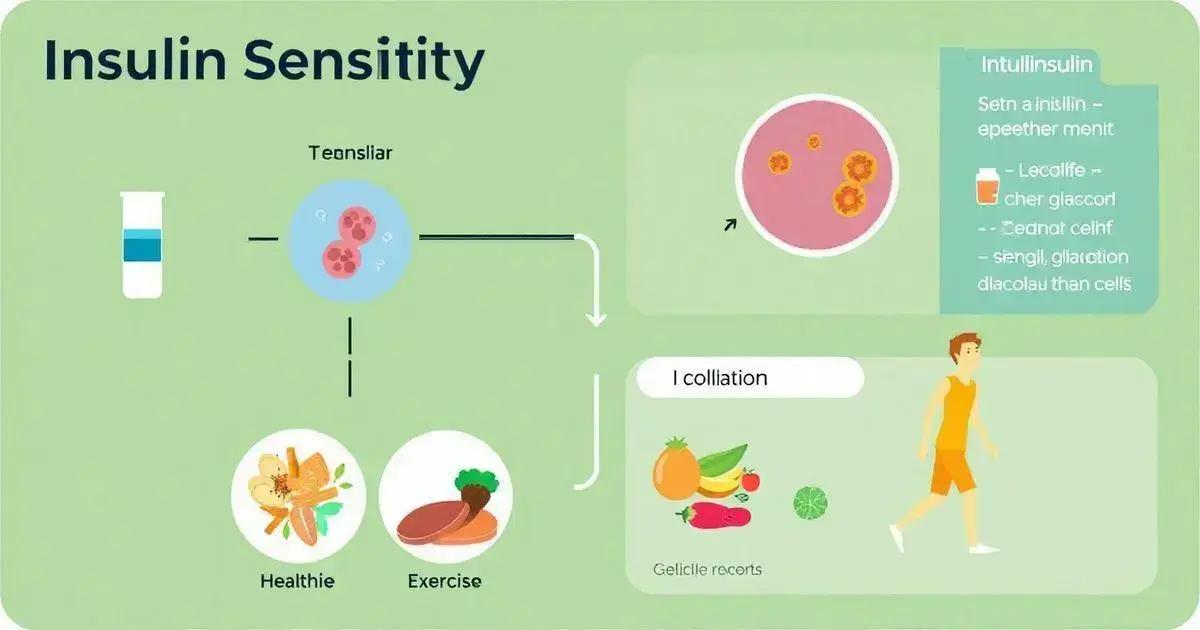To address insulin sensitivity through lifestyle changes, focus on maintaining a balanced diet rich in whole foods, engaging in regular physical activity, and managing stress effectively. These strategies can significantly improve insulin response and promote overall health.
In today’s fast-paced world, many people are unaware of how lifestyle choices impact their health. Addressing insulin sensitivity can significantly enhance overall wellness and reduce the risk of chronic diseases. This article covers practical lifestyle changes to improve insulin sensitivity effectively. We will discuss the importance of diet, exercise, and stress management.
Understanding Insulin Sensitivity

Insulin sensitivity is a crucial aspect of metabolic health. It refers to how responsive your cells are to insulin, a hormone that assists in glucose uptake. When you have good insulin sensitivity, your body can effectively manage blood sugar levels and convert glucose into energy. However, low insulin sensitivity leads to excess sugar in the bloodstream, increasing the risk for conditions like type 2 diabetes.
How Insulin Works
Insulin is produced by the pancreas and released into the bloodstream after meals. Its primary role is to regulate glucose levels. When you eat carbohydrates, they break down into glucose, causing blood sugar levels to rise. In response, insulin signals your cells to absorb the glucose. Effective insulin response allows your body to use this energy for daily activities.
Signs of Poor Insulin Sensitivity
People with poor insulin sensitivity might experience fatigue, weight gain, and difficulty concentrating. Other signs include frequent hunger, high blood sugar levels, and increased fat storage. Recognizing these symptoms early can help you make necessary lifestyle adjustments.
The Importance of Insulin Sensitivity
Good insulin sensitivity is vital for maintaining a healthy metabolism. It helps in regulating blood sugar levels, reducing fat storage, and preventing health complications. When cells efficiently respond to insulin, it can lower the chances of developing serious conditions like metabolic syndrome and cardiovascular diseases.
The Role of Diet in Insulin Sensitivity

The diet you choose plays a significant role in improving insulin sensitivity. Certain foods can enhance how your body reacts to insulin, while others may harm your sensitivity. By focusing on nutritious choices, you can support your metabolic health effectively.
Whole Foods vs. Processed Foods
Whole foods, like fruits, vegetables, whole grains, and lean proteins, offer essential nutrients without added sugars or unhealthy fats. These foods can help maintain stable blood sugar levels. On the other hand, processed foods rich in refined sugars and unhealthy fats often lead to insulin resistance.
Fiber-Rich Foods
Incorporating fiber is vital for improving insulin sensitivity. Foods high in fiber, such as beans, lentils, fruits, and vegetables, can slow the absorption of sugar and help control blood sugar levels. Aim for a variety of fiber sources to maximize benefits.
Healthy Fats
Healthy fats, like those found in avocados, nuts, seeds, and olive oil, can also support insulin sensitivity. These fats help reduce inflammation and improve cholesterol levels, making them an excellent choice in a balanced diet.
Limit Sugary Beverages
Sugary drinks and high-fructose corn syrup products can lead to spikes in blood sugar. Reducing or eliminating these beverages from your diet can significantly enhance insulin sensitivity. Opt for water, herbal teas, or black coffee instead.
Physical Activity and Insulin Sensitivity

Physical activity plays a key role in enhancing insulin sensitivity. Regular movement helps your body use insulin more effectively, making it easier to regulate blood sugar levels. Engaging in various forms of exercise can significantly influence your metabolic health.
Types of Exercise
Different types of exercise contribute to insulin sensitivity in unique ways. Aerobic exercises, such as walking, running, or cycling, improve cardiovascular fitness and increase insulin sensitivity. Strength training, involving weights or resistance bands, helps build muscle mass, which is crucial for better glucose uptake.
Exercise Frequency and Duration
To experience significant health benefits, aim for at least 150 minutes of moderate exercise weekly, along with strength training on two or more days. You can break up your activity into smaller chunks, like 30 minutes a day, to make it more manageable and enjoyable.
Impact on Weight Management
Physical activity not only helps with insulin sensitivity but also aids in weight management. Maintaining a healthy weight reduces the risk of insulin resistance. Combining exercise with a balanced diet can maximize your efforts toward achieving better metabolic health.
Mind-Body Connection
Consider incorporating activities that promote both physical fitness and mental well-being, such as yoga or tai chi. These exercises are known to reduce stress, which negatively impacts insulin sensitivity. A well-rounded approach to fitness can lead to improved overall health.
Stress Management Techniques for Better Insulin Response

Managing stress is essential for better insulin response. When you’re stressed, your body releases hormones like cortisol, which can decrease insulin sensitivity. Practicing effective stress management techniques can help mitigate these effects.
Deep Breathing Exercises
One effective technique is deep breathing. Take a few minutes each day to focus on your breath. Inhale deeply through your nose, hold for a moment, and exhale slowly through your mouth. This practice calms the mind and reduces stress levels.
Mindfulness and Meditation
Mindfulness and meditation can greatly benefit your mental health. Spending 10 to 15 minutes daily on mindfulness practices can enhance your awareness and help you stay calm. Apps and guided sessions can be great resources if you’re new to meditation.
Physical Activity for Stress Relief
As mentioned earlier, physical activity not only boosts insulin sensitivity but also helps relieve stress. Engaging in regular exercise releases endorphins, which improve mood. Aim for activities you enjoy, whether it’s dancing, running, or yoga.
Social Connections
Building strong social connections can also reduce stress. Spending time with friends or family, even through simple phone calls or video chats, can uplift your spirit. Sharing thoughts and feelings can lighten your emotional load and positively impact health.
In conclusion, addressing insulin sensitivity through lifestyle changes is essential for overall health
By understanding how insulin sensitivity works and its implications for your health, you can take proactive steps to enhance your well-being. A balanced diet rich in whole foods, regular physical activity, and effective stress management techniques are all crucial components for improving insulin response.
Implementing these changes may seem challenging at first, but small, consistent efforts can lead to significant results over time. As you incorporate these strategies into your daily routine, you’ll likely notice improvements not just in your insulin sensitivity, but also in your overall energy levels and mood.
This holistic approach empowers you to take control of your health, paving the way for a lifestyle that promotes longevity and vitality. Start your journey toward better insulin sensitivity today, and enjoy the benefits that come with it.
FAQ – Frequently Asked Questions About Addressing Insulin Sensitivity
What is insulin sensitivity?
Insulin sensitivity refers to how responsive your cells are to insulin. Good insulin sensitivity helps regulate blood sugar levels effectively.
How can diet impact insulin sensitivity?
A balanced diet rich in whole foods, fiber, and healthy fats can enhance insulin sensitivity, while processed foods can negatively affect it.
What types of exercise improve insulin sensitivity?
Both aerobic exercises, like running and cycling, and strength training, like weightlifting, can improve insulin sensitivity.
How does stress affect insulin response?
High stress levels lead to the release of hormones like cortisol, which can decrease insulin sensitivity, making stress management essential.
What are some effective stress management techniques?
Techniques like deep breathing, mindfulness meditation, exercise, and maintaining social connections can help reduce stress and improve insulin response.
How long should I exercise to improve insulin sensitivity?
Aim for at least 150 minutes of moderate exercise each week, along with strength training on two or more days to improve insulin sensitivity effectively.













